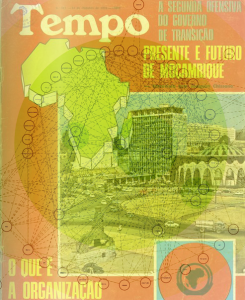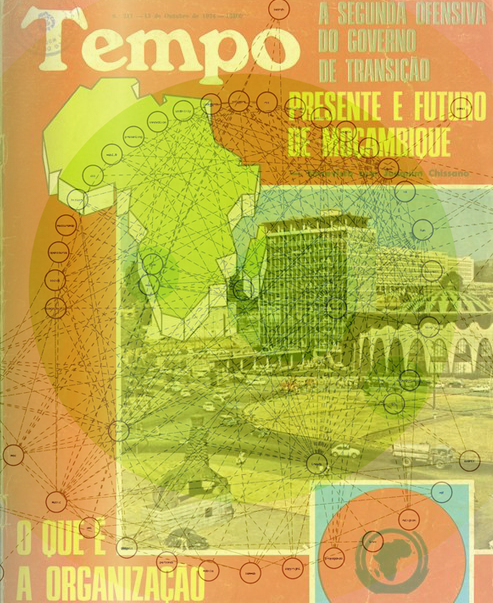
A mashup of Tempo, a Mozambican magazine from the liberation period (1975 or so), and visualized networks.
There will probably be quite a few of these posts as I begin this process of doctoral study at the Institute of Education and begin to navigate my way through academia firsthand. I have done a lot of elearning over the years and haven’t been on a physical campus as a student since 1997. 15 years makes a student a little rusty, so I find myself doing a lot of mental preparation for the bureaucratic bits (registering, orienting, getting an ID card, etc.) as opposed to the actual study. But I doubt anyone would want to read a post about the bureaucratic bits so let me push forward with the academic parts.
From Mongolia to Tanzania
My proposed field of study is developing (and evaluating the efficiency of) mobile environments that support academic communities of practice in developing nations. Specifically, I will be targeting the practice of the Humanities in higher education in either
- Tanzania/Zanzibar
- Mongolia
Yes, those locations are considerably different, but both are fascinating from a mobile perspective. Mongolia because it is still so nomadic (essentially nomadic is mobile) and so the cultural scaffold is already in place for mobile learning at scale. It is rare that one is able to map a technological environment onto existing cultural and academic norms. Tanzania/Zanzibar because there are tenuous links with the island/mainland (Zanzibar is the ‘zan’ in Tanzania) and there is a neighboring model (Kenya) that is demonstrating the power of home grown technological innovation and mobile use on an emerging economy. Tanzania is paying attention and making baby steps towards greater focus in these areas. So both of these areas have ingredients that spell some sort of potential impact. So I need to explore these in my PhD work.
Don’t shy away from vision/delusions of grandeur
I should pull back a bit and mention a larger vision here. I am not interested in doing research for the sake of research. I have worked too long and hard to see this as a perfunctory exercise. I value the PhD less than the actual expertise and I want this work to mean something or to put me in a position where I can do work that actually means something. This exercise is too time and resource demanding to get caught up in titles, awards, honors, etc. I believe we have an impact in this world or we don’t and mine won’t be too determined by fear (of doing or not doing something) or laziness. I am not getting any smarter and I am certainly getting older so it is time to put this plan in motion. That is my urgency and my motivation.
My vision is this. I have a technology that is everywhere (mobile) and I have a community that bypassed a lot of the digital communities stuff we sort of take for granted. Many communities naturally gravitated towards digital ‘locations’, many were born in digital spaces. In short, the digital world proved to be an incubator for a great social reorganization (I obviously am not one who laments a purported loss of ‘real human contact’ in online spaces; I think we are intensely more social) that continues today. We are privy to more, learn from our chosen community more, expand our collective knowledge base more (and more rapidly). It happens so ubiquitously that we take it for granted. Not so in my developing areas of focus. Nothing is taken for granted.
So, there are many many benefits from academic communities collaborating online. Even more so in the developing world where many work in a de facto isolation. Your academic community is your department, your body of work is reflective of parochial practice, your knowledge base is whatever you can access. None of this is talent or ambition driven. All of it is exposure and interaction. So, networking academic communities seems like a no-brainer. All of them. Everywhere.
I see these networks as conduits for greater knowledge creation, dissemination, and impact. Like a collective brain creating additional neurons to account for need. It grows and grows. More importantly, it is autonomous, self-correcting so it can adjust to need or demand. It governs itself. These are profound shifts in our view of how knowledge is constructed, how academic practice is performed. So hitching the horse (mobile technology) to the cart (Humanities practice in higher education) might prove too cumbersome, too restrictive, or just right. But there is fuel in that connection of technology and practice; it is just a matter of whether or not it is the right fuel. So I see it as reinvigorating, perhaps even crystallizing for the practice of Humanities in the developing world. A chance for them to find a common voice and demonstrate to their societies their impact on art, literature, literacy, national identity. These ‘soft’ skills seem superfluous to developing needs, but they are the connective tissues of societies, the long-term preservation model for a national identity.
Quantitative and Qualitative
So yesterday I registered for classes after some exchanges with my supervisor. I had read the Doctoral Handbook cover to cover (twice) and familiarized myself with the course listings. I have developed a research outline for myself, a sort of reflection on my strengths and weaknesses and my chosen classes reflect an attempt to plug those gaps and build on strengths. What this means pragmatically is that I will be attempting a nimble balance between qualitative and quantitative methodology.
Quantitative-this is my greatest weakness as a researcher. Aside from taking two Research Methods courses for my two Masters, I don’t feel comfortable developing a quantitative research agenda, collecting data, and analyzing it soundly at this stage of my career. Not sure if I could be comfortable at this stage, hence the coursework. For my Phd, this quantitative bit will correspond to mobile usage for academics, broader demographic information, and controlled experiments towards academic workflows (are Historians able to perform Process #35 in mobile environments at standards that meet existing disciplinary practice?). A lot of this stuff will be both quantitative and qualitative, but I need the quantitative bits.
Qualitative- although I feel more comfortable with qualitative analysis, I need to sharpen my skills here. Although this mobile learning is a technological intervention/environment, first and foremost it is a collaborative one, one with a myriad of social dimensions. Technology when applied to knowledge construction is a highly, highly social process and mobile’s ability to satisfy these social demands will be paramount to success. Determining levels of comfort with the technology and its ability to satisfy disciplinary practice in the Humanities will involve a lot of participatory design and qualitative analysis. Together, we determine needs, determine comfort, build it, iterate it, reflect on it, use it. Technology isn’t the only determinant to success here; this minefield is laden with social, highly idiosyncratic mechanisms and processes. I need qualitative skills to interpret the tea leaves here.
So do I know how to do this now? No. Will I make a fool of myself at some point in this process? Yes, repeatedly. Will I learn and grow? Yes, at times painfully. Will it be worth it? Absolutely, but perhaps not in the way it was intended.
Nothing else really matters, the titles and such. It is about impact and an understanding of the role we have to play in our service to this world, helping others reap the benefits of their environments as we have in our own. It is a touchstone for this life. Putting networks in motion and getting out of the way. Dumping ego for impact. Easier said than done.

Institute of Education, University of London
